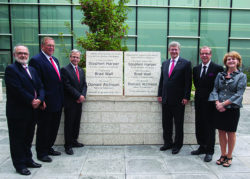 Menu
Menu
 Menu
Menu

Saskatoon Mayor Don Atchison with Stephen Harper, Brad Wall, and others at the University of Saskatchewan.
Now that we have an idea of what aspects of our life are impacted by local government, we should get to know the people who make up our local government.
In Saskatchewan, municipalities are representative democracies. This means that we elect representatives to act on our behalf, to hear our concerns, and to ensure that the local government and the public servants who work for it act in our community’s best interests as a whole.
In urban municipalities, we elect councillors and a mayor. In rural municipalities, we elect councillors and a reeve. Together, they make up what is called a council. They are responsible for bringing forth sustainable government and positive changes to communities. Therefore, they must:
In addition to the above duties for everyone on council, the mayor or reeve must also preside over meetings of the council, sign all bylaws that council passes, and sign many agreements into which the municipality enters.
Being a member of a local council is demanding work. Even so, the job in communities big or small is considered a part-time job. People on council often have day jobs in addition to their duties on council. However, in bigger cities the job of mayor is considered a full-time job. The mayor will often have an office and an assistant.
Because councillors attend council meetings, committee meetings, and community events, they often have to arrange their day-job schedules around these commitments. While councillors are not obliged to attend community events, a councillor can be removed from office for repeatedly failing to attend council meetings.
Perhaps the most important responsibility of our elected representatives is to hear the voices of everyone in the community. Remember: Governments are not put in place to impose their views upon us. As citizens, we democratically choose our governments to reflect our wishes for society.
Saskatchewan communities are becoming increasingly diverse, with people of different ages, genders, cultural heritages, and occupations.